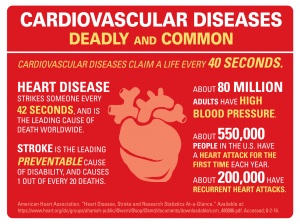PREVENT AND HEAL THE DAMAGE OF CARDIOVASCULAR DISEASE
INFOMEDICA’S BOTTOM LINE:
Despite warnings about diet and lifestyle issues, heart disease is still the number one killer of men and women in America.
While there’s no substitute for anti-inflammatory foods and proper activity, there are nutrients that can promote the strength of the heart, flexibility of the arteries, and help normalize blood pressure numbers.
These nutrients can prevent or treat:
- High blood pressure
- Atrial fibrillation (irregular heartbeat)
- Atherosclerosis (hardening and narrowing of arteries)
- Coronary heart disease
- Cholesterol oxidation and plaque formation

Heart disease statistics can seem overwhelming, and your patients may feel that as they struggle to correct dietary or lifestyle patterns that may have contributed to current cardiovascular issues. You can help them by recommending supplemental ingredients to get them back on track.
Magnesium
Magnesium is an energy mineral, and is critical to the functioning of the mitochondria, the cells’ engine.
In fact, magnesium—or the lack of it—can be considered a deciding factor for many heart conditions. Magnesium works with calcium to keep the heart beating in a regular rhythm, and is also important in keeping blood pressure from getting too high.
A Finnish study found that because of magnesium’s essential relationship to cellular energy and heart rhythms, low levels are a risk for heart failure in men—even after accounting for other lifestyle factors, blood pressure, and weight.
There are a lot of forms of supplemental magnesium out there, but one that is chelated to the amino acid glycine absorbs more efficiently in the intestinal tract, and can work more effectively in the body.
Vitamin B1/Benfotiamine
Benfotiamine is a fat-soluble form of vitamin B1, also known as thiamine. Deficiencies of thiamine are common in people with heart failure. Benfotiamine helps repair the cells inside blood vessels and arteries, especially after damage caused by high blood sugar. And that ability to repair blood vessels isn’t limited to diabetes-related injury. Scientific research shows that benfotiamine also protects the brain and assists in recovery after a heart attack.
Thiamine is also required for the energy needs of the mitochondria—the “engine” of heart cells. Without the right levels of this important nutrient, the heart just won’t have the energy it needs to work properly.
Vitamin B6/P-5-P
Vitamin B6—especially in the pyridoxal-5-phosphate (P-5-P) form has been shown to reduce homocysteine (an amino acid associated with increased risk of heart disease). It also works to prevent ischemic heart disease, the narrowing of the arteries that leads to less blood and oxygen reaching the heart and ultimately, angina pectoris.
Researchers have found that one of the ways P-5-P does this is by affecting the levels of calcium in the bloodstream—somewhat like a prescription calcium channel blocker would, but without the adverse effects. Treatment with P-5-P can prevent abnormal heart rhythms, so the heart is under less stress and works properly.
And because of its abilities to affect calcium in the bloodstream, it can prevent damage to the arteries following coronary artery bypass surgery, too.
Pomegranate Fruit Extract
Pomegranate has been shown to decrease LDL cholesterol aggregation (the clumping together of oxidized cholesterol in the arteries), lower blood pressure, and boost the activity of enzymes that protect LDL from oxidation. It has also been shown to raise levels of glutathione (the body’s own natural antioxidant) by 141% in patients with diabetes. But beyond that, pomegranate also helps keep arteries flexible and strong—a key factor for preventing high blood pressure and atherosclerosis.
Pomegranate is a great source of polyphenols and anthocyanins that prevent oxidative damage and stop cellular deterioration. They help the body recover from damage, and, according to one study, reduced episodes of stress-induced heart attack in patients with coronary heart disease.
Research published in the journal Atherosclerosis showed that the polyphenols in pomegranate inhibit angiotensin converting enzyme (ACE) activity by 36 percent—activity that would otherwise lead to high blood pressure. In other words, pomegranate works like a prescription ACE inhibitor but without side effects or complications.
Concentrating pomegranate in the form of extracts can help target its benefits—and make it more convenient (no sugary juice) to consume and more easily combined with other nutrients.
Grape Seed Extract
Grape seed extract reduces high blood pressure, protects the blood vessel walls from free radical damage, and prevents the dangerous oxidation of LDL cholesterol—one of the first steps on the road to a heart attack or stroke.
In an Italian clinical study, individuals with slightly increased blood pressure levels were divided into three groups, two with grape seed extract, at lower or higher dosages, and one with a diet and exercise intervention only, serving as a control group. At the end of the four-month trial, both grape seed extract groups saw an improvement in blood pressure, although those at the higher dosage noticed more dramatic effects. In fact, blood pressure numbers normalized in 93 percent of those in the higher dosage group.
Other scientific studies have found that grape seed extract helps prevent blood clots from forming without thinning the blood, lowers blood pressure, and shields blood vessels and arteries from free radical damage.
The most beneficial compounds in grape seed extract are the oligomeric proanthocyanins (OPCs), which is a tannin-free French grape seed extract with only low-molecular weight OPCs is the key to a grape seed extract that really works. If the OPCs are not standardized to a small size, they don’t absorb.

Heart Disease is Not Inevitable!
Your patients may have a family history of heart disease or other cardiovascular issues. Or they may simply be concerned as they get older about the overall health of their heart. The nutrients outlined here can go a long way to preventing heart disease or stopping it from recurring, and help prevent any of your patients from becoming a statistic.
For supporting the strength of the heart, flexibility of the arteries, and healthy blood pressure numbers, recommend a combination of vitamin B6 as P-5-P, magnesium, French grape seed extract, pomegranate fruit extract, and vitamin B1 as benfotiamine daily.


